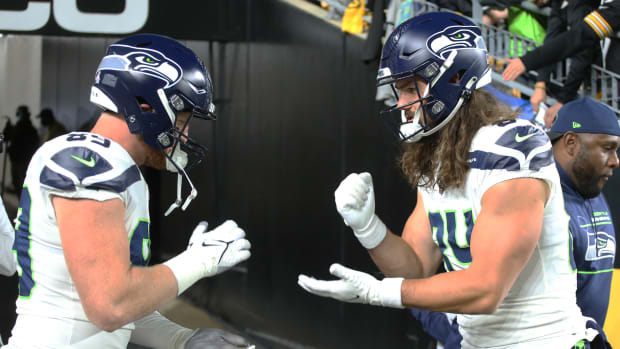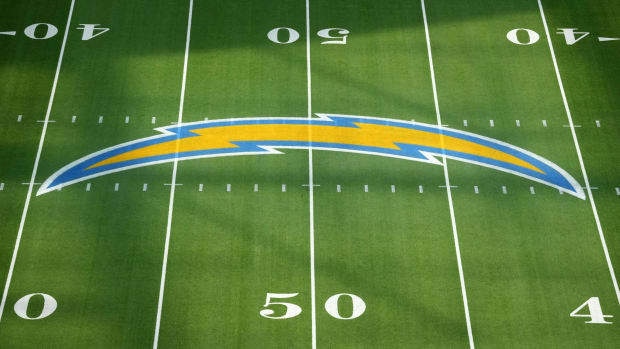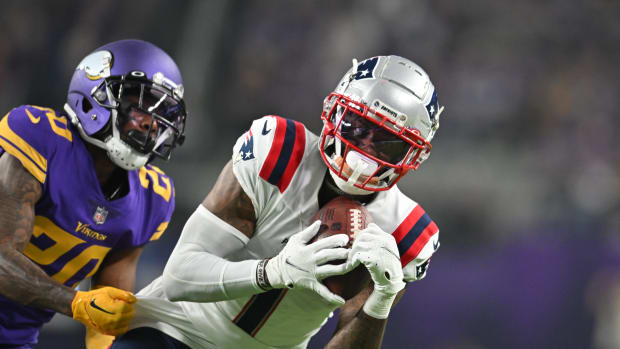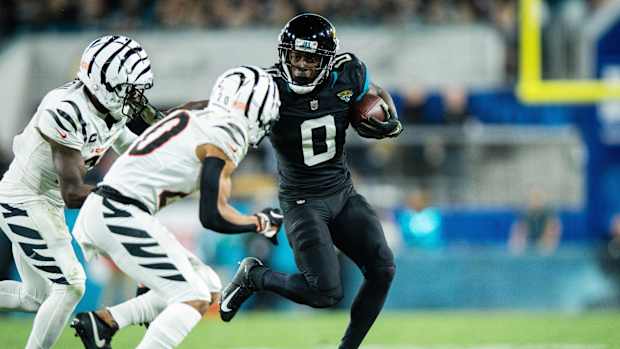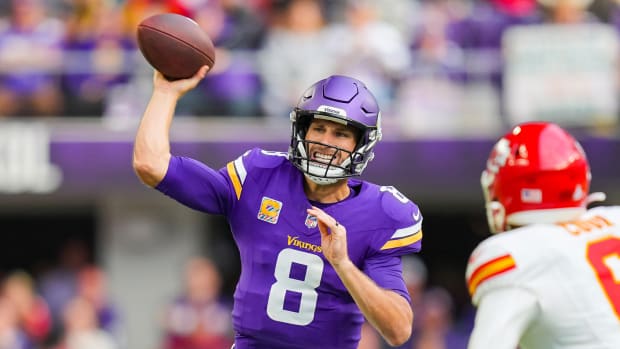
Back to School with DeMarcus Ware
(John Leyba/The Denver Post via Getty Images)
NOTRE DAME, Ind. — After nine seasons, seven Pro Bowls, and 117 sacks, the Dallas Cowboys cut ties with DeMarcus Ware, in part, to save $16 million. Choosing to look forward to his new role in Denver, the defensive end has glossed over one inevitable question following his release. Here it comes again:
Did it hurt?
His answer is quiet, like Ware himself, and sincere. Not really, he says, but if it happened four years ago, it would have floored him.
“If I wasn’t in a business state of mind and I was thinking about my ego, I would ask, ‘Why?’ ” he says. “Before 2009 I would’ve been devastated, like, ‘What is going on? Why do they not want me here? What did I not do last season?’
“But in 2009 I had my career almost ended by a neck injury. I started thinking seriously about life after football. Now it’s like, I’ve had a fulfilled career, I know what I want, and it’s business. You have to move on knowing you created a lot of relationships you still have, and now this is another hurdle. Just jump and keep running as long as you can.”
That ‘business state of mind’ is what brought Ware to Notre Dame’s rain-soaked campus on a Thursday in April. The NFL’s Player Engagement program now offers a handful of entrepreneurial seminars on college campuses across the country each offseason for current and former players to conference with business professors and corporate mentors, all expenses paid. The goal is to avoid the kind of financial difficulty many find themselves in after their playing days are over. (In 2009 SI found that within two years of retirement, 78 percent of former NFL players are either under financial stress or have gone bankrupt.)
Ten of the players at the conference were asked to provide brief “elevator pitches” for their business ideas. For Ware, who has earned $52 million in nine years, cramming a career’s worth of ideas into a two-minute presentation proved impossible.
Ware at a seminar at Notre Dame on Thursday. (Courtesy of NFL)
“I want to make a shirt that would correct posture, and I want to change the dynamics of how shoulder pads are made,” Ware began.
It’s all very inside baseball, but the gist is this: Shoulder pads come in sizes without much modification, beyond bulkier sets for the big guys and lightweight stuff for little guys. With the help of Douglass, an athletics manufacturer, Ware has for the past four seasons customized his pads and passed his designs on to fellow Cowboys, which he says reduces stingers for himself each season. He’ll spend the rest of the week at Notre Dame working with business experts to figure out what to do with his big idea.
Uncanny Foresight
Boston College running back Andre Williams is planning for life beyond football before his NFL career has even started.
Not that such an offseason program guarantees smooth sailing. As former NFL player Deke Cooper, a panelist on the entrepreneurial seminar, said, “I can tell you my pitfalls and my strategies, but I can’t say that they will necessarily work for you. It’s not like you’re on a ride at Disney World and there are bumpers telling you where to go. It’s more like you’re in the ocean, and you have a compass.”
Still, Ware was impressed. “It’s a great program, and it’s free, so why wouldn’t you do it? When it’s in the offseason, a lot of guys feel it's going to take away from their time off. It's about your priorities and what type of person you are. You can go on vacation, but this right here is a vacation to me. You learn a lot and you’re stimulating your mind instead of staying stagnant.”
The life
Speaking of stimulating offseasons, here’s a look at Richard Sherman’s schedule over a recent six-day stretch:
Tuesday: Traveled from St. Lucia in the Caribbean, where he was vacationing, to Utah to speak at Adobe Summit 2014.
Wednesday: Flew home to L.A., dinner with body armor company to discuss endorsement.
Thursday: 7 a.m. Oberto beef jerky commercial shoot. 45-minute ride to catch private plane with Tim Tebow to watch the Stanford and Florida basketball teams play in the Sweet Sixteen. (Sherman on Tebow: “He’s really, really, realllly cool. Real competitor. Really wants to get back into the game and find his way back. Just a wonderful person.”)
Friday: Landed in L.A. at 1 am.
Saturday: Opening of Champ Sports in Santa Monica, drove to Compton to see billboard that his family bought to celebrate his 26th birthday; party at go-kart track.
Sunday: Visit Brandon Browner at home in L.A. Said Sherman: “I’ve been away more than I’ve been home.”
Despite some apparent fatigue, Sherman has adapted well to his new popularity. He still regularly works out, and his brother and agents run interference on all media and business opportunities. His girlfriend schedules his flights, and his cousin is the bodyguard.
Seeking insight as to how other players have adapted to instant celebrity and hectic offseasons, I asked Vernon Davis how he coped with becoming an offseason brand as a young 49ers tight end.
“It’s like with everything in life—you have a plan” Davis said, “Within that plan, you take it one day at a time and try to execute the plan.”
Davis, who was supposed to attend the Notre Dame player engagement seminar but had to cancel, has built around him a team of assistants and advisors who help manage his many interests, including the Vernon Davis Foundation and more than a dozen endorsements and investments. He says the opportunities started pouring in after his second season in San Francisco.
“If it’s something I think I’ll be overwhelmed with, I won't do it,” Davis says. “I got an offer to do Dancing With the Stars this year but couldn’t, even though it was a beautiful opportunity. I have a feel for [the demands] now. I know what could be too much for me.
“I feel like in life you keep reaching and reaching until you can’t anymore. I take every opportunity because that’s what life is all about, especially if you’re building positive relationships.”
Sherman is in high demand. Hopefully, like Davis, he can maintain it and manage it for nearly a decade.
LA calling?
(Illustration by AEG via Getty Images)
Around the NFL the sentiment is that a team in Los Angeles is inevitable, and would represent a goldmine. At the Super Bowl I met a guy I hoped could address that second assumption.
I was introduced to Michael Lipman, owner of Tickets of America, a ticket reseller, and White Glove International, a sports concierge service, at a restaurant at the Times Square Sheraton. He’s an older guy with 20 years of experience reselling tickets. He wore a dark tracksuit with a hat and sunglasses indoors. In other words, he looked nothing and everything like you would expect a guy who moves 1,000 tickets per Super Bowl to look. Lipman also deals in most of the other major North American sports, with the bulk of his money coming from the NBA. He’s the guy the Miami Heat trust with filling their exorbitantly priced floor seats for every home game.
I caught up with Lipman, who lives in South Beach, by phone this week.
The MMQB: Do you think that there’s a ticket market for a team in Los Angeles, or would we see a repeat of Los Angeles Raiders and Los Angeles Rams failures?
ML: “That Southern California market is an extremely fidgety market. A lot of the successful business models in the NFL – Jerry Jones with the Cowboys stadium – basically sold a whole stadium of corporate seats. So they’re really not going after the fan; it’s to maximize the dollar. If you took say, the Raiders to L.A., there wouldn’t be a big corporate draw, so you’d have to hope there would be a big dedicated fan draw like the Packers, but nobody is the Packers.”
The MMQB: Mark Cuban infamously said about a week ago that the NFL was heading for a fall, that it was getting too big. Do you think that the NFL has gotten too big? Is the demand for tickets too low?
ML: “Yeah, I think greed has been a big part of it, and Mark Cuban is on the money when it comes to the greed. They are trying to dictate an artificially high market. They made face value for a club seat $2500 for the Super Bowl. Compare to last year’s face value: $1500 a ticket. People wouldn’t pay it, and it went down. I think they are miscalculating what corporate America is willing to spend ever since the economy tanked.”
The MMQB: Isn’t the TV money they’re making enough to compensate for whatever lack of interest there is in actually going to the games?
ML: “Absolutely. The caveat of the whole thing is the television revenue. But, image wise, there would be a black eye to the NFL to bring up and franchise and then not fill up a stadium. There are no LeBrons in the NFL, very few superstars, so I think it’s more difficult to get sell out crowds. Long story short, you have to build a winning team. I know Miami fans or LA fans – they’re fair weather fans. There would be a one- or two-year honeymoon with any team, and then they would have to win.”
Moving Forward
I’m borrowing this Friday space from Greg Bedard this week because he’s writing the Monday Morning Quarterback column. We’re all pinch-hitting because Peter King is tending to his brother’s passing in England. I have two younger brothers, both in college, and I’ve been thinking all week about how devastating it would be if one of them weren’t with us.
A quick personal story: My middle brother is very tall. He’s 6-9 (no one else in our family is taller than 6-2) and while he was shooting up like a cornstalk in high school I used to call him “My Giant” after that Billy Crystal movie. He didn’t like that, so of course I kept calling him My Giant. Then last summer he started getting headaches in the center of his head and our mother told him to go to the hospital and get a CT scan. We soon found out he’s an actual giant, or something like it. At some point in his childhood he developed a pituitary tumor, which is fairly normal (20% of adults have them). But my brother fell into the absolutely minuscule percentage of people with problem pituitary growths. His tumor spawned the disease Acromegaly, which manipulates the gland in such a way that it creates a surplus of growth hormone (Technically, he’s not a giant because that classification is reserved for 7-footers). In any case, there are some NFL players who would kill for some extra naturally occuring growth hormone in their blood stream. Unfortunately my brother had so much of it in his body that it threatened to kill him. His hands and feet are very large, and if this had gone undetected he could’ve died of organ failure (In all likelihood, the disease killed famous pro wrestler Andre the Giant at 46 years old).
Robert Quinn. (Dilip Vishwanat/Getty Images)
When he was diagnosed I began reading about skull tumors, and I learned that St. Louis Rams defensive end Robert Quinn is the only player in the NFL known to have a tumor still in his head. As a high school senior, Quinn began getting headaches and was diagnosed with a benign brain tumor. He had surgery in October 2007 to reduce its size and to drain excess fluid, which could have left him brain-dead if the accumulation continued. Twice a year he gets the tumor scanned for growth. I decided to get Robert on the phone to talk to my brother, so I hit up Rams ace PR man Artis Twyman, and shortly we were on the phone with the budding defensive end. We were in a car on the way to Johns Hopkins hospital for a pre-surgery checkup with Dr. Gary Gallia when Quinn gave us this advice: “I don’t think about it much. God gave me a pass, and when it’s my time it will be my time. It’s a part of me now. Don’t dwell on it. Go on, regardless of what happens.” Comforting words. So about a month after the discovery, the Klemko clan rolled up to Hopkins at 4:30 a.m. to see my brother off to a surgery that was set to last eight hours. At about 7 a.m. we were all standing around the hospital bed as they were going through the final pre-surgery checklist. I started feeling like I would vomit. I felt cold and damp and the room starting fading into an opaque color. I tried to take a step and my feet wouldn’t move. Then BAM, I hit the floor, my head falling at my dad’s feet. He cried, “Robert, what the hell have you done?!” I was out for a few minutes and ended up in the emergency room. My brother, I was told, was asked if he had any more questions before they wheeled him away. His response: “Yea, what happened to him?” When I came fully to, I woke up in the emergency room with my family members in various states of befuddlement. Naturally, I whipped out my phone and took a Vine.
Today, my brother’s GH levels are returning to normal, and even his hands and feet are less bulky than before. He had a successful 8-hour surgery, no thanks to me.
Nickel package
1. How is it that the NFL and the NFL Players Association held their respective meetings in Orlando during the same week last month, and the two sides didn’t communicate? There were representatives from the league who presented new points of emphasis for 2014 to the player reps, but nothing beyond that. It’s not as if they had nothing to talk about: For one, HGH testing is still being held up two years after it was provided for in the new CBA, because the union wants a neutral arbitrator to hear appeals for violations, rather than Goodell deciding both the punishment and the appeal. For the sake of player health, somebody budge already.
2. The NFL needs more men like Troy Vincent spreading its education gospel throughout the league and beyond. Vincent, the new NFL executive vice president of football operations, arrived in Gainesville on Thursday morning to speak to the Florida football team. The graduation rate for white athletes at UF, Vincent notes, is double that for black athletes in recent years. “My heart pours out for these young men,” Vincent said, “because when I look at them I see my son.”
3. The uniform nerd in me is excited to see how crisp that No. 11 DeSean Jackson jersey will look on Sundays. Per Cardinals PR man Mark Dalton, wide receivers were allowed to wear numbers 10 through 19 beginning in ’04. I’m a strong believer that you have to be a badass on the field to justify one of those numbers. Randy Moss (18) and Larry Fitzgerald (11) come to mind. If you’re a regular dude, just wear a regular number.
4. The rising number of athletes drafted from FCS schools (chart below) can only be good for the league. With last year’s influx of small-school draftees and the growing diversity of backgrounds among rosters, it seems NFL teams are beginning to realize how many talented guys there are not just in lower NCAA divisions, but playing in the CFL and even in other sports across the world. As teams like Indianapolis commit more resources to the process, it seems we’re headed towards a true meritocracy in scouting. That can only be a good thing. FCS Players Drafted by Round, 2004–13
| 04 | 05 | 06 | 07 | 08 | 09 | 10 | 11 | 12 | 13 |
1st Rd |
|
|
|
| 2 |
|
|
|
|
|
2n Rd |
| 2 | 2 | 1 | 1 |
|
| 1 | 1 | 1 |
3rd Rd |
|
| 2 |
| 1 | 3 | 2 | 2 | 1 | 2 |
4th Rd | 1 | 1 | 1 | 2 |
| 1 | 1 | 5 | 3 | 4 |
5th Rd |
|
| 1 | 1 | 3 |
|
| 1 | 2 | 3 |
6th Rd |
|
| 3 | 1 | 3 | 2 | 2 |
| 2 | 2 |
7th Rd |
| 1 | 2 |
|
| 1 | 3 | 3 | 1 | 6 |
Total | 1 | 4 | 11 | 5 | 10 | 7 | 8 | 12 | 10 | 18 |
5. Von Miller is about to learn a heck of a lot from watching DeMarcus Ware, who told me he’s out to “make all of my worst critics eat their words.” And if Von doesn’t grow exponentially in one season under that man’s wing, he can only blame himself.





































